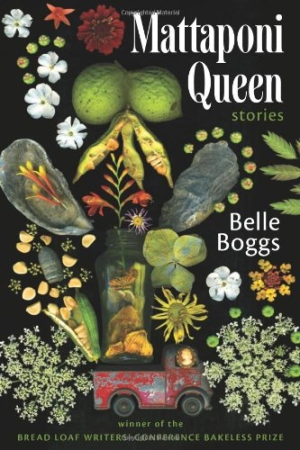Mattaponi Queen
Belle Boggs grew up in the rural region of Virginia where her short stories are set, and one gets the feeling she hung around the grocery store, the boat launch, the Mattaponi River and reservation, eavesdropping and absorbing the particular dialects and dispensations of the area.
In her story “Imperial Chrysanthemum,” a wealthy woman is obsessed with tracking down her $40,000 silver set after it goes missing from her home. “Cutie lets vagrants sleep under her front porch, except when she’s out of town,” Boggs writes. “…It is not as bad a place to sleep as ‘under the porch’ sounds: the porch is raised, and there’s grass under there. Also, they are not sleeping so much as napping after doing yard work for her while consuming great amounts of beer or Ripple.” Of course, the story is not about silverware, but about class, race, and how far apart we can be even when we live right down the road.
Boggs was busy teaching grade school so it was her husband who, unbeknownst to her, submitted the manuscript for publication—a big-hearted gesture befitting one of her characters. Although Boggs has published stories in some distinguished magazines, this is her first book and it would suggest she’s off to a good start. Mattaponi Queen was selected by Percival Everett for the 2009 Katharine Bakeless Nason Literary Publication Prize for Fiction and comprises twelve linked stories in which characters turn up, take off, change, and become more of who they were all along. It’s a clever conceit: there is much satisfaction in following the threads of those who appear in more than one story, and it keeps things chugging along much like a novel.
Here are stories about self-possessed women who work, are lonely, and are wary of men without being bitter. In “Opportunity,” these women don’t chafe against their waning idealism: one character would “prefer the old days, when you might have married someone distantly related, some sort of cousin. At least then you knew what you were getting, she said: that was the kind of romantic interest she took in men.”
These are also stories about how fathers and daughters navigate relationships without grown women or mothers anywhere in the picture, and stories about things turning out differently than hoped or expected; these are real-sounding lives in which emotions run toward a calm, cool acceptance rather than resignation or drama.
Boggs’ style is characterized by lyric description bound on all sides by plain-spoken action, naturalistic dialogue, and unhurried forward momentum. She takes her time. It is well worth sitting down and tucking into her words for a while.
Reviewed by
Holly Wren Spaulding
Disclosure: This article is not an endorsement, but a review. The publisher of this book provided free copies of the book to have their book reviewed by a professional reviewer. No fee was paid by the publisher for this review. Foreword Reviews only recommends books that we love. Foreword Magazine, Inc. is disclosing this in accordance with the Federal Trade Commission’s 16 CFR, Part 255.

